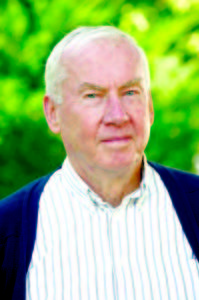Precht: Home thoughts from abroad
By Henry Precht
BN Columnist
I believe there’s a rule that when you write for The Bridgton News, there should be a connection — even a glancing one — to Bridgton itself. I’ve been fretting about that this week because the subject I want to discuss is distant in space and about every other way from our lakeside home. I want to write about our October stay in Rome. The richness of those days might be of some interest to local friends.
The main connection I have found (devised) between Bridgton and the Italian capital is that both boast of artificial mountains that no one is allowed to scale. You are familiar with the lofty green hill at the transfer station. It is prickled with vent pipes for methane gas because buried within it are years of decaying garbage and pre-recycling other stuff.
The neighborhood where we stayed is named for Rome’s man-made Monte Testaccio. Its origins date back to ancient days when the neighborhood was the port on the Tiber for wine and olive oil shipped in clay amphorae. These jugs were too cheap to be returned and reused by producers in Spain or Sicily. They were busted up and thrown out back, creating a 150-foot high hill. An excess of shard-picking tourists caused the mountain to be closed off, but the wine shops that were carved into its cool, damp sides still prosper.
Rome didn’t. Like Bridgton, changing times brought new conditions. The barbarian invasions cut the water supply, the population declined, the port closed. Testaccio became a desolate area for centuries until the 19th when the unification of Italy brought new life. The city’s huge slaughterhouse was built there, as well as, model apartment blocks for workers. Well, maybe not so model, for they lacked all utilities. Come Mussolini and, better, post-WWII prosperity and the area was rejuvenated. Apartments were updated by the residents; now they are being gentrified by developers. The slaughterhouse was closed; now it houses an art gallery and a new open-air market. (The area’s eating places still have tripe and other offal on their menus.)
Our apartment building faced a two-block public square. On our end was the playground for small children; at the other end elderly folk read or sat and remembered. Facing the square was our only church. In the surrounding streets were small supermarkets, which didn’t faze the many small shop owners, cafes whose tables spilled into the square, a theater, banks and to our pleasure excellent bread and ice cream stores and a pizzeria. I guess you would say it was a typical, ordinary neighborhood, a fact recognized by one street being closed off for a week for the filming of an international movie.
Like Bridgton, we were some distance from the principal tourist sites — although we did have Roman walls and a pyramid, plus Keat’s grave in the Protestant cemetery. The problem was solved for us — unlike for Bridgton — by superb public transportation of buses, trams and a metro. For many Romans the solution was a two-seat car or, better, a scooter. The price of gas — maybe four times ours — was an incentive for smallness.
Rome is attuned to ecological and social needs. You sort trash for recycling and garbage; it is picked up twice a week. The streets are sprayed with high-pressure hoses and swept almost every day. Health care is covered by — you choose — a national scheme or private medicine. All this, generous pensions and widespread tax dodging add to the huge national debt which the technocrat government is trying to trim, drawing some public opposition.
We read often about the radical Moslem Arab threat to Europe. There are, to be sure, people of darker hue about. But the ones I met were from Bangladesh (running fruit stores) or Christians from India and the Philippines working as nurses or other low paying jobs. I never saw or heard any negative reaction from pale faces.
The moral of this tale, I submit, is that we ought to keep an open mind about the superiority of our system to the feared “European socialism.†It might be, for example, that more small shops and fewer national chains, a cheaper single payer health care system and functioning public transportation systems would serve us better.
Henry Precht is a summer Bridgtonian.


